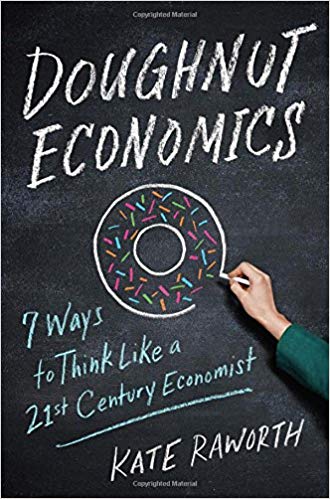
Doughnut Economics: Seven Ways to Think Like a 21st-Century Economist
Kate Raworth
Publisher
Chelsea Green Publishing
Publication Date
3/22/2017
ISBN
9781603586740
Pages
320
Categories
About the Author

Kate Raworth
Questions & Answers
The "Doughnut" concept, introduced by Kate Raworth, is a visual representation of a safe and just space for humanity within the boundaries of social and planetary sustainability. It consists of two concentric rings: the inner ring represents the social foundation, encompassing essential human needs like food, water, education, and healthcare; the outer ring represents the ecological ceiling, which includes planetary boundaries like climate change and biodiversity loss. The space between these rings is the Doughnut, where humanity can thrive without exceeding the planet's limits.
This concept redefines the goals of economics for the 21st century by shifting the focus from GDP growth to human well-being and environmental sustainability. It emphasizes meeting the needs of all people within the planet's carrying capacity, aiming for a balance between social equity and ecological protection. This reimagined economic goal promotes a thriving economy that is not solely dependent on growth but is instead designed to be regenerative and distributive, ensuring prosperity for all while preserving the planet's health.
Doughnut Economics addresses the limitations of the Circular Flow diagram and other mainstream economic models by offering a more holistic and dynamic perspective. The Circular Flow diagram, while useful for illustrating income flow, overlooks the environment and society, leading to an incomplete view of the economy. Doughnut Economics, on the other hand, introduces the "Doughnut" concept, which centers on meeting human needs within planetary boundaries. This approach emphasizes the importance of balancing social equity and ecological sustainability, moving beyond GDP growth as the sole measure of progress. It also incorporates a more nuanced view of human nature, recognizing social, interdependent, and reciprocal behaviors, and promotes a diverse economy that includes households, markets, the commons, and the state. Additionally, Doughnut Economics advocates for systems thinking, recognizing the interconnectedness of economic, social, and environmental systems, and encourages a shift towards regenerative and distributive economic designs.
The book "Doughnut Economics" by Kate Raworth presents seven key ways to think like a 21st-century economist:
- Change the Goal: Shift from GDP growth to a focus on human well-being and environmental sustainability, represented by the Doughnut model.
- See the Big Picture: Recognize the economy as an embedded system within the biosphere, interconnected with Earth's resources and human activities.
- Get Savvy with Systems: Understand the economy as a complex adaptive system, using systems thinking to analyze feedback loops and dynamics.
- Design to Distribute: Focus on creating economies that are more equitable, redistributing wealth and power to ensure a fairer distribution of value.
- Create to Regenerate: Design economies that are regenerative, promoting circular economies and restoring natural systems.
- Be Agnostic About Growth: Develop economies that can thrive without constant growth, focusing on sustainability and well-being.
- We Are All Economists Now: Encourage a broader understanding of economics, involving diverse perspectives and disciplines in shaping economic policies and practices.
Doughnut Economics proposes redesigning money, finance, and business to serve people and the planet by focusing on sustainability, equity, and regeneration. It suggests:
-
Redesigning Money: Shift from debt-based money creation by banks to a system where the state and the commons also create money, ensuring it serves the economy and society. This could include complementary currencies and state-led monetary policies that prioritize long-term investments and equitable distribution.
-
Transforming Finance: Redesign finance to serve society by focusing on long-term investments that generate social and environmental value, not just financial returns. This involves reining in speculative finance, promoting community banks, and encouraging ethical investment.
-
Reimagining Business: Encourage businesses to be regenerative by design, focusing on reconnecting with nature's cycles and creating enterprises that contribute to a thriving world. This includes employee-owned companies, cooperatives, and businesses with a living purpose that aligns with regenerative and distributive design principles.
Implementing Doughnut Economics in the real world presents significant challenges and opportunities. The main challenge is redefining economic goals beyond GDP growth to focus on human rights and planetary boundaries. This requires a shift in mindset and policy, which can be daunting due to entrenched economic structures and ideologies.
Opportunities arise from the potential for creating more sustainable, equitable, and regenerative economies. This can lead to innovations in business models, finance, and governance that prioritize social and environmental well-being.
Individuals can drive change by adopting more sustainable lifestyles, supporting regenerative businesses, and engaging in political activism. Businesses can contribute by adopting regenerative practices, creating shared value, and investing in renewable technologies. Governments play a crucial role in setting policies that promote sustainability, redistributing wealth, and ensuring equitable access to resources. Collaboration among these stakeholders is essential for a successful transition to Doughnut Economics.